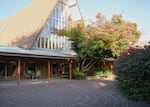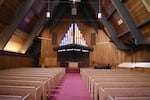Eugene’s Queer Resource Center is changing its name and moving into a new building, with plans to expand its services and begin hosting more community events.

The courtyard at the new site of the The Lavender Network resource center. It opens Nov. 4.
Nathan Wilk / KLCC
The Lavender Network will be located inside the former Trinity United Methodist Church on Maxwell Road. HIV Alliance Development Director Brooks McLain said the goal is to create a true community center there.
“Social isolation is rampant among queer people, and that really does affect rates of suicide and access to health care — access to gender-affirming care, especially,” said McLain. “And so it’s an effort to improve mental health and health care outcomes for LGBTQ people.”
The project is a collaborative effort between Queer Eugene, HIV Alliance, TransPonder, Eugene Pride, and Eugene Performing Arts. It’s also supported by a grant from Trillium Community Health Plan of more than $430,000.
It will house new and existing support services, including STI prevention, counseling, substance abuse assistance, and a gender-affirming clothing closet.

TransPonder runs Sylvia's Closet, which will relocate to the site. It offers free gender-affirming clothing items to community members.
Nathan Wilk / KLCC
There will also be spaces to host community events and meetings which organizers say weren’t feasible in the old Queer Resource Center on Arthur Street.
The new building has a performance hall, an interior-facing courtyard, and a sanctuary used by the former church congregation.
“It’s kind of an overwhelming amount of space for the community compared to what we’ve been used to,” said McLain. “So we’re really excited to program it and build out how we’re going to use it.”
McLain said since Eugene’s only LGBTQ+ bar closed earlier this year, community events have been scattered across venues, making them difficult to keep track of. He believes this building will provide a central gathering space.
In addition, McLain said the Lavender Network can host events that forgo alcohol, which is more difficult for a bar to do. He said this will make the programming more accessible to people in recovery.

The sanctuary at the former Trinity United Methodist Church.
Nathan Wilk / KLCC
The Lavender Network is renting the space from the Oregon-Idaho Conference of the United Methodist Church, after the local congregation shut down late last year.
The resource center will share the building with services already operating there, including the FISH Food Pantry and a local pre-school.
“I believe that the building, from a churchy perspective, still has sacred purpose,” said Naphtali Renshaw, the on-site representative for the Oregon-Idaho Conference trustees. “And that sacred purpose is to be with, and for, the community.”
Lavender Network Project Manager Laura Henry said some LGBTQ+ people may have complicated relationships with religion, but most people surveyed said they would be willing to use the church. Henry also said they’re working the owners to mitigate potentially triggering imagery.
Henry said with current funding, the Lavender Network will be able to stay in this building until at least the end of 2025. They said they’re already applying for further grants, and will seek public donations.
“We’re hoping, once we open up and get more community events going, get the word out more, that the community can help us support ourselves to provide these services that hopefully people want,” said Henry.
The Lavender Network will be open to the public starting Nov. 4.
This republished story is part of OPB’s broader effort to ensure that everyone in our region has access to quality journalism that informs, entertains and enriches their lives. To learn more, visit our journalism partnerships page.
Correction: In the original version of this story, the names of Brooks McLain and Naphtali Renshaw were misspelled.